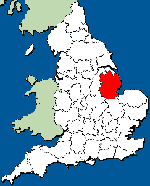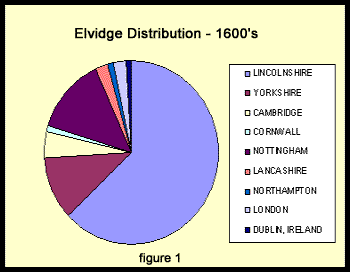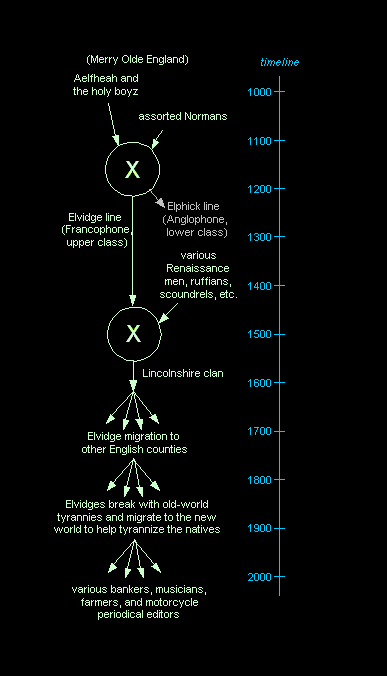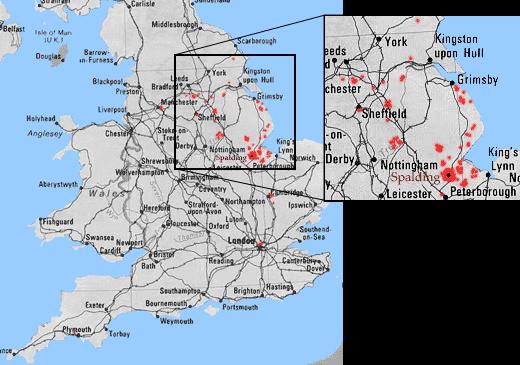LINCOLNSHIRE
- Lincolnshire is also known as "the cradle of Elvidge civilization".
Based on the records found in the International Genealogical Index for the
British Isles (which, in turn, come from
ELVIDGE MIGRATION -
The Elvidge is a migratory animal and couldn't sit still long. Job opportunities,
family feuds, jealous husbands, gambling debts, and many other reasons drove
them out of greater Spalding. Figure 3 below shows the locations of Elvidges
in England during the 1500's and 1600's (as derived from the IGI records). Except
for a couple outliers in Dublin, London, and Cornwall, most of them clustered
around northeastern England; Lincolnshire, Yorkshire, and Nottinghamshire. There
are 41 records from Spalding or Moulton near Spalding. Other concentrations
of Elvidges occur in Coningsby, Lincolnshire (13) and Sutton cum Lound (10)
in Nottinghamshire.
-----------------------------------------------------------------
-----------------------------------------------------------------
baptismal
and marriage records from parish registers dating back to 1530), 90% of the
IGI Elvidge records prior to 1610 are within 10 miles of Spalding, Lincolnshire.
There were several different spellings of the name during that time (see Elvidge
Name for more), but they evolved into the name we know and love. Including
those records, there were about 200 unique Elvidge entries in the IGI from 1530
through 1700. 130 of them came from Lincolnshire. Some regions seemed a little
slow getting on the ball with their records - for example,
up until 40 years
after the first marriage record. So although it is probably not an accurate
representation of the population, Figure 1 on the right shows the distribution
of IGI records with the Elvidge name by county or region.
There are some interesting
records to note. A very prolific Ellvidge couple - John and Agnes, married
in Spadling in 1596 had 8 kids by 1610. A possible 9th, Theophelus, was born
in 1612, the
customary 18 months after the last one, although his last name is given as
Elvidge (one
in
Yorkshire, there are several marriage records in the early 1600's,but a birth
record doesn't show
"l." A Margerett
(accurate spelling was NOT a high priority in those days) Ellvidge with a
father John, was born 7 years later in Spalding, probably the same family.
Many of the later Elvidge's in the area appear to be descended from this family.
There is also a curious
set of records from Pinchbeck, Lincoln in 1691. A Mary Elvidg married one
John Rastall on 9 November, 1691 in Pinchbeck. A couple weeks later, on 25
November, 1691, a Catherine Elvidg marries the same John Rastall in the same
place. Was John living a double life, or did he get the wrong girl the first
time around (maybe they were twins?). One can imagine many possibilities.
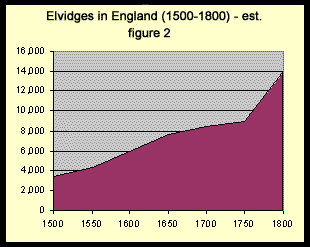
So
how many Elvidge's were living in England during these times? That is a little
difficult to answer, but Martin Ecclestone's 'The diffusion of English surnames'
(Local Historian, 1989), describes a method to estimate the population of a
particular family name based on the total number of IGI records in the database.
According to this method, there may have been around 14,000 Elvidge's in England
in 1800. Working backwards, and assuming a similar rate of growth to the general
population of England, we get the population chart shown on the left.
-----------------------------------------------------------------
FIGURE
3



